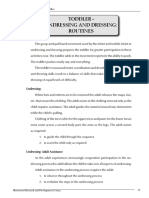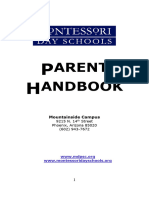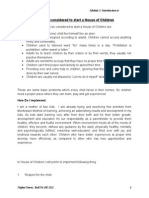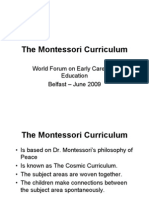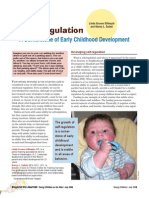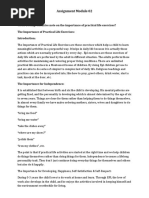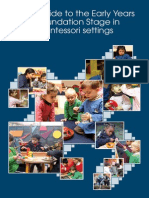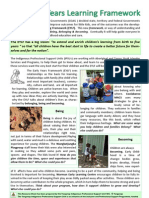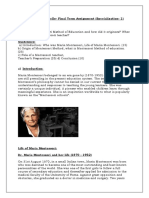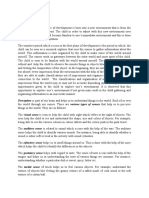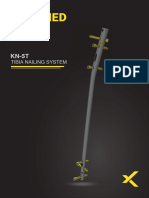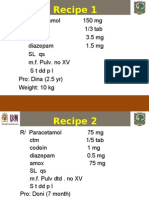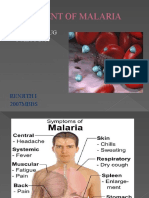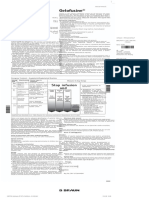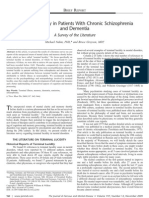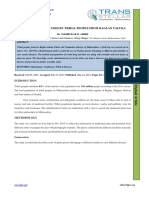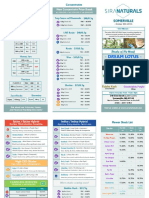Biting Policy
Biting Policy
Uploaded by
Julie PeaseyCopyright:
Available Formats
Biting Policy
Biting Policy
Uploaded by
Julie PeaseyOriginal Description:
Original Title
Copyright
Available Formats
Share this document
Did you find this document useful?
Is this content inappropriate?
Copyright:
Available Formats
Biting Policy
Biting Policy
Uploaded by
Julie PeaseyCopyright:
Available Formats
1.
16 biting : The Beacon Day Nursery
At The Beacon Day Nursery we follow a positive behaviour policy to promote positive
behaviour at all times. However we understand that children may use certain
behaviours such as biting as part of their development. Biting is a common
behaviour that some young children go through and can be triggered when they do
not yet have the words to communicate their anger, frustration or need.
Our procedures
The nursery uses the following strategies to prevent biting: sensory activities, biting
rings, adequate resources and staff who recognise when children need more
stimulation or quiet times. However, in the event of a child being bitten we use the
following procedures. The most relevant staff member(s) will:
Comfort any child who has been bitten and check for any visual injury.
Administer any first aid where necessary. Complete an accident form and
inform the parents via telephone if deemed appropriate. Continue to observe
the bitten area for signs of infection. For confidentiality purposes and possible
conflict we do not disclose the name of the child who has caused the bite to
the parents.
Tell the child who has caused the bite in terms that they understand that biting
(the behaviour and not the child) is unkind and show the child that it makes
staff and the child who has been bitten sad. The child will be asked to say
sorry if developmentally appropriate or helped to develop their empathy skills
by giving the child who has been bitten a favourite book or comforter.
Complete an incident form to share with the parents at the end of the childs
session.
If a child continues to bite, carry out observations to try to distinguish a cause,
e.g. tiredness or frustration.
Arrange for a meeting with the childs parents to develop strategies to prevent
the biting behaviour. Parents will be reassured that it is part of a childs
development and not made to feel that it is their fault.
In the event of a bite breaking the skin and to reduce the risk of infection from
bacteria, give prompt treatment to both the child who has bitten and the child
who had been bitten.
If a child or member of staff sustains a bite wound where the skin has been severely
broken arrange for urgent medical attention after initial first aid has been carried out.
In cases where a child may repeatedly bite and/or if they have a particular special
educational need or disability that lends itself to increased biting, e.g. in some cases
of autism where a child doesnt have the communication skills, the nursery manager
will carry out a risk assessment and may recommend immunisation with hepatitis B
vaccine for all staff and children.
This policy was adopted on
Signed on behalf of the nursery
Date for review
September 2015
C.M.Hall
September 2016
You might also like
- Infants and ToddlersDocument14 pagesInfants and ToddlersJosias Smith100% (1)
- Parent Handbook Covid-19Document16 pagesParent Handbook Covid-19api-294681692No ratings yet
- Handbook of Orthopaedic TraumatologyDocument145 pagesHandbook of Orthopaedic TraumatologyDonna Williams100% (2)
- Infants Social and Emotional Developmental Stages PDFDocument12 pagesInfants Social and Emotional Developmental Stages PDFHuzaifah Bin SaeedNo ratings yet
- Maria MontessoriDocument5 pagesMaria Montessoriniwdle1No ratings yet
- Professional Development Plan 2Document2 pagesProfessional Development Plan 2api-363763782No ratings yet
- Family Engagement Plan PaperDocument6 pagesFamily Engagement Plan Paperapi-354741670No ratings yet
- Medsurg Nursing Medications Cheat Sheet: by ViaDocument2 pagesMedsurg Nursing Medications Cheat Sheet: by ViaABEGAIL SARASUANo ratings yet
- Bowel Obstruction PathophysiologyDocument4 pagesBowel Obstruction PathophysiologyAya BolinasNo ratings yet
- Toddler Discipline: Effective Strategies to Eliminate Tantrums and Raise a Happy, Confident, and Respectful Child. Tips to Turn Your Little Devil Into a Little AngelFrom EverandToddler Discipline: Effective Strategies to Eliminate Tantrums and Raise a Happy, Confident, and Respectful Child. Tips to Turn Your Little Devil Into a Little AngelNo ratings yet
- Infant-Toddler CompetenciesDocument11 pagesInfant-Toddler Competenciesapi-297446915No ratings yet
- The Importance of Care Routines in Early Childhood SettingsDocument3 pagesThe Importance of Care Routines in Early Childhood Settingsapi-307622028100% (2)
- Educ 456 TpaDocument4 pagesEduc 456 Tpaashleyb12No ratings yet
- Life and Works of DrMAriaDocument19 pagesLife and Works of DrMAriaSa100% (1)
- No Biting, Third Edition: Solutions and Support for Toddler ProgramsFrom EverandNo Biting, Third Edition: Solutions and Support for Toddler ProgramsNo ratings yet
- Running Head: PLAYDocument6 pagesRunning Head: PLAYapi-278753886No ratings yet
- Activity Plan Music and MovementDocument2 pagesActivity Plan Music and Movementapi-497850938100% (1)
- Infant: Presentedby: Suyman, Julie L. Presentedto: Mrs - Annbeth CallaDocument13 pagesInfant: Presentedby: Suyman, Julie L. Presentedto: Mrs - Annbeth CallaEiluj MoonNo ratings yet
- MIT.p - SP Dressing and Undressing Step by StepDocument11 pagesMIT.p - SP Dressing and Undressing Step by Stepziz37No ratings yet
- Family With A ToddlerDocument11 pagesFamily With A ToddlerAira Kharys P. VerdidaNo ratings yet
- Parent HandbookDocument21 pagesParent HandbookmichellemonicamartinezNo ratings yet
- Further Information: ManualDocument44 pagesFurther Information: Manualmina mirNo ratings yet
- Concept and Principle of Child DevelopmentDocument16 pagesConcept and Principle of Child Developmentmomu100% (1)
- Language Development 1Document2 pagesLanguage Development 1Felipe Cabrera InostrozaNo ratings yet
- Case Analysis For ToddlerDocument5 pagesCase Analysis For ToddlerJanine mae MacaraigNo ratings yet
- 1-What Are Sensitive Periods?: When Occur The Sentive Period in The Life of A Child?Document7 pages1-What Are Sensitive Periods?: When Occur The Sentive Period in The Life of A Child?Jhunior ContrerasNo ratings yet
- Building Positive Relationships With ChildrenDocument2 pagesBuilding Positive Relationships With ChildrenDevin MarshallNo ratings yet
- EYLF Planning Cycle PDFDocument1 pageEYLF Planning Cycle PDFUzma SiddiquiNo ratings yet
- Q2 M 1requirements To Start House of ChildremDocument3 pagesQ2 M 1requirements To Start House of ChildremNighat Nawaz100% (4)
- 5 GlasgowDocument24 pages5 Glasgowbentarigan77100% (1)
- NAEY. Self Regulation - A Cornerstone of Early Childhood DevelopmentDocument6 pagesNAEY. Self Regulation - A Cornerstone of Early Childhood Developmentkiks101No ratings yet
- Sensorial: HTS0001 HTS0002 HTS0003 HTS0004Document13 pagesSensorial: HTS0001 HTS0002 HTS0003 HTS0004Kamal R NairNo ratings yet
- 2017 12 14 Lesson 1 - ChooseMyPlateDocument12 pages2017 12 14 Lesson 1 - ChooseMyPlateEdlynNo ratings yet
- The Ten Secrets of MontessoriDocument4 pagesThe Ten Secrets of MontessoriJessa Resuello FerrerNo ratings yet
- Daily Life Activities AlbumDocument143 pagesDaily Life Activities AlbumAuraIsabelDuarteDuránNo ratings yet
- ToddlerDocument11 pagesToddlerLian QuilbioNo ratings yet
- Module 2 Assignment PDFDocument12 pagesModule 2 Assignment PDFAishaNo ratings yet
- Infanttoddler Observation Educ 121Document11 pagesInfanttoddler Observation Educ 121api-216183591No ratings yet
- Guide To EaraAly YSsearsDocument40 pagesGuide To EaraAly YSsearsmartinoNo ratings yet
- Biographical Note On Maria Montessori Author Montessori School of OceansideDocument20 pagesBiographical Note On Maria Montessori Author Montessori School of OceansideCivil CourtNo ratings yet
- If You Give A Moose A MuffinDocument25 pagesIf You Give A Moose A Muffinapi-373177666No ratings yet
- Montessori PrinciplesDocument6 pagesMontessori Principlesapi-269680928No ratings yet
- Cognitive DevelopmentDocument6 pagesCognitive DevelopmentRasugu OkadoNo ratings yet
- Early Years Learning Framework ResourceDocument4 pagesEarly Years Learning Framework ResourceNoureen AnsariNo ratings yet
- Reggio Emilia ApproachDocument4 pagesReggio Emilia Approachmohanraj2purushothamNo ratings yet
- In Casa de BambiniDocument2 pagesIn Casa de Bambiniparadise schoolNo ratings yet
- Fcs 359 Lesson Plan 2Document2 pagesFcs 359 Lesson Plan 2api-384129594No ratings yet
- Complementary and Toddler FeedingDocument74 pagesComplementary and Toddler FeedingJohnPaulOliveros100% (1)
- Home Safety Checklist May 2009Document4 pagesHome Safety Checklist May 2009Giselle MorrisNo ratings yet
- Montessori Method - Final Assignment 1 - 22 MAY 2022Document11 pagesMontessori Method - Final Assignment 1 - 22 MAY 2022Jennifer BotheloNo ratings yet
- Www. Montessori-France - Asso.fr: Offered byDocument7 pagesWww. Montessori-France - Asso.fr: Offered bypalitha6719No ratings yet
- Reflection For Preschool Lesson 1Document4 pagesReflection For Preschool Lesson 1api-535311838No ratings yet
- Home Infant-Toddler ScaleDocument3 pagesHome Infant-Toddler Scaleapi-512202267No ratings yet
- 2440 816 PBDocument95 pages2440 816 PBVioletaNo ratings yet
- Sensory Art Activity PlanDocument5 pagesSensory Art Activity Planapi-394117333No ratings yet
- Physical Development of Infants and ToddlersDocument30 pagesPhysical Development of Infants and ToddlersDiana Garcia SaclutiNo ratings yet
- King Focused Preschool ObservationDocument14 pagesKing Focused Preschool Observationapi-348470934100% (1)
- Introduction To Sensorial AreaDocument8 pagesIntroduction To Sensorial AreaStasha GonsalvesNo ratings yet
- Early Childhood Education PhilosophyDocument3 pagesEarly Childhood Education PhilosophyHa HangNo ratings yet
- Connecting With PracticeDocument3 pagesConnecting With PracticeSusan JackmanNo ratings yet
- Floor Plan and Iters GradingDocument5 pagesFloor Plan and Iters Gradingapi-510112249No ratings yet
- Early Learning Centre Learning Experience: Student Name: Vanessa Uy Date: November 10, 2016 Age Group: Preschool PurposeDocument3 pagesEarly Learning Centre Learning Experience: Student Name: Vanessa Uy Date: November 10, 2016 Age Group: Preschool Purposeapi-312661775No ratings yet
- Resource Book (Jamaica)Document298 pagesResource Book (Jamaica)Huey RisaNo ratings yet
- 23 ENT DiordersDocument114 pages23 ENT Diordersmohamed shamsNo ratings yet
- Laboratory Activity 13Document2 pagesLaboratory Activity 13Shekinah AlcarionNo ratings yet
- 2688-Article Text-6969-1-10-20230701Document6 pages2688-Article Text-6969-1-10-20230701Nurul KhotimahNo ratings yet
- KN-5T TibiaDocument21 pagesKN-5T TibiaJarinthon Armengot LopezNo ratings yet
- MCN-RLE - Quiz#1. Ramos, L.Document3 pagesMCN-RLE - Quiz#1. Ramos, L.Louwella RamosNo ratings yet
- Comp6 Unit3a Lecture SlidesDocument30 pagesComp6 Unit3a Lecture SlidesHealth IT Workforce Curriculum - 2012No ratings yet
- Farmasi Praktis 1 (Formula)Document8 pagesFarmasi Praktis 1 (Formula)Thinakaran KandayahNo ratings yet
- Treatment and Management AppendicitisDocument3 pagesTreatment and Management Appendicitisruthjoy23upgirlNo ratings yet
- Treatment of Malaria RenjithDocument10 pagesTreatment of Malaria RenjithRenjith IndrajithNo ratings yet
- Seating Arrangement For The Test I & Ii: Instruction DivisionDocument17 pagesSeating Arrangement For The Test I & Ii: Instruction DivisionsaimanobhiramNo ratings yet
- Amy Dhillon Levine, DPM: Education & TrainingDocument3 pagesAmy Dhillon Levine, DPM: Education & TrainingapnipatNo ratings yet
- Paediatric Guidelines, Uganda Final 2017Document78 pagesPaediatric Guidelines, Uganda Final 2017Chol Koryom CholNo ratings yet
- Gelofusine®: Stop Infusion andDocument2 pagesGelofusine®: Stop Infusion andRudy Arindra WijayaNo ratings yet
- Elc 590 PersuasiveDocument4 pagesElc 590 PersuasiveMohamedFittriNo ratings yet
- Product: Toothpaste: Brand: ColgateDocument15 pagesProduct: Toothpaste: Brand: ColgateYash ParekhNo ratings yet
- Michael Nahm - Terminal Lucidity in Patients With Chronic Schizophrenia and DementiaDocument3 pagesMichael Nahm - Terminal Lucidity in Patients With Chronic Schizophrenia and DementiascholoNo ratings yet
- Call It SociologyDocument163 pagesCall It SociologySohail LatifNo ratings yet
- Linea Prime Orales Antiestrogenos: ImagenDocument69 pagesLinea Prime Orales Antiestrogenos: ImagenfitCoof CasNo ratings yet
- ACLS For TachycardiaDocument31 pagesACLS For TachycardiaTausif HaqueNo ratings yet
- Salwa P1 - Patient Safety Concept Housemen KKM SlidesDocument30 pagesSalwa P1 - Patient Safety Concept Housemen KKM SlidesHazmin ZolkapliNo ratings yet
- E Book HandstandDocument8 pagesE Book HandstandBorislav Georgiev100% (1)
- Medicinal Plants Used by Tribal People From Baglan Taluka: Dr. Madhukar D. AhireDocument4 pagesMedicinal Plants Used by Tribal People From Baglan Taluka: Dr. Madhukar D. AhireTJPRC PublicationsNo ratings yet
- MRB Annual Planner 2020Document3 pagesMRB Annual Planner 2020RameshNo ratings yet
- Sira Somerville Daily MenuDocument2 pagesSira Somerville Daily MenumrmookieNo ratings yet
- Allium CepaDocument8 pagesAllium CepaAru VermaNo ratings yet
- Child Protection PolicyDocument10 pagesChild Protection PolicyBautista JomarieNo ratings yet
- MethylphenidateDocument3 pagesMethylphenidateAyhan CiftciNo ratings yet


















